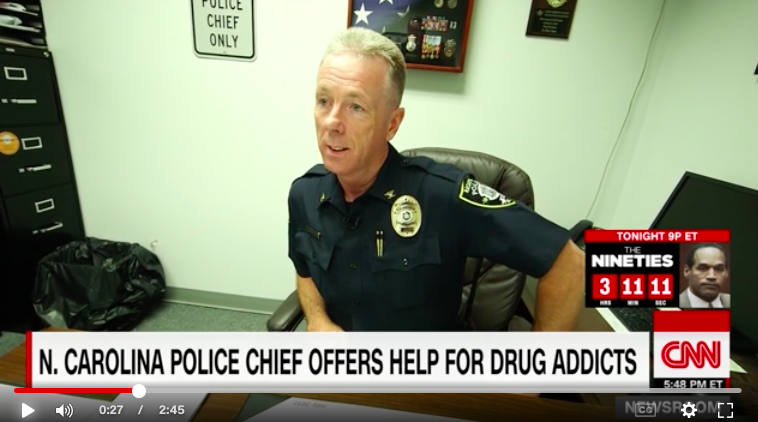CNN recently featured an effective drug rehabilitation initiative in Nashville, a small North Carolina of 5,400. Nashville’s HOPE program is “modeled after the innovative ‘Angel’ program in Gloucester, Massachusetts, which opens the way for addicts to get police assistance and medical help without fear of arrest, is a way of rethinking law enforcement’s role in responding to this growing epidemic,” says the report.
A release from the City of Nashville describes the program:
The Nashville Police Department is working to get ahead of this [opioid] problem by offering this program before someone else becomes a statistic. During the past several months we have been consulting with organizations such as the Police Assisted Addiction and Recovery Initiative (PAARI), the North Carolina Harm Reduction Coalition (NCHRM), Nash County District Attorney Robert A. Evans, The Emergency Department at Nash UNC Healthcare, as well as a number of faith based groups, treatment facilities, and volunteers.
Those seeking help for their addiction can come to the Nashville Police Department and request assistance. The Nashville Police Department will then work individually to get them the immediate resources and help they need. Individuals will also be able to turn over any drugs or paraphernalia they have without fear of arrest or prosecution. The Nash County District Attorney Robert A. Evan was consulted and is very supportive of the program. Again, those seeking help will not be charged and the drugs or paraphernalia will be disposed of properly.
Addicts can turn themselves into police with their drugs and paraphernalia. Rather than face arrest, they get help getting into a program to fight addiction.
Since the program began, Bashore said, crime is down 40% in the town, about 45 miles northeast of Raleigh. “We’ve had a pretty significant drop in our crimes that are associated with substance-abuse disorder. Things like shoplifting and larcenies and breaking into cars.”
HOPE is not limited to residents of Nashville. People from all over the state have walked through the police station doors, as well as people from California and Pennsylvania.
An article on the initiative earlier this year in the News & Observer notes that in 2015, “1,102 people died of accidental overdoses of heroin and opioid medications… up from less than 100 in 1999.” It continues:
Fatal heroin overdoses in the state more than quadrupled in five years to 369 in 2015, the last year for which data is available. State health officials say if current trends continue, accidental overdoses from opioid drugs will surpass motor vehicle fatalities as the state’s leading cause of death.
Watch the CNN story HERE.
Thanks to Glenn Davis for alerting us to this story.

